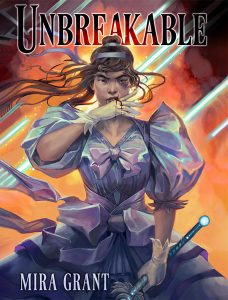Caren Gussoff Sumption Reviews Unbreakable by Mira Grant
 Unbreakable, Mira Grant (Subterranean, 978-1-64524-103-4, $45.00, 152pp, hc), December 2022.
Unbreakable, Mira Grant (Subterranean, 978-1-64524-103-4, $45.00, 152pp, hc), December 2022.
Have you ever had a book sneak up on you? I mean, had something about the title, maybe the cover art, the back description make you think, ‘‘Meh, this will be okay,’’ but then – then you read it – and it smacks you upside your head because it was so unexpectedly, so unbelievably good?
Yeah, Seanan McGuire’s (writing as Mira Grant) latest novella, Unbreakable, was exactly like that. I was utterly unprepared for how excellent it would be. The premise, following a squad of ‘‘magical,’’ Kawaii child superheroes – especially ones called ‘‘Unbreakable Starlight,’’ sounded, well… less than promising and definitely a bit canned. Not my thing. A bit like Sailor Moon redux. I did not have particularly high hopes.
Oh, reader, I was wrong.
Unbreakable does open with its troupe of chosen girls, all adorable, all in complicated-but-also-adorable outfits (and, yes, called ‘‘Unbreakable Starlight’’) as they battle otherworldly villains to protect our world. But they’re losing. Dying, even. It’s a bloody mess, with most of Seattle in ruin, a fine, red mist – what is left of most of the city’s inhabitants – covering every surface. In the end, the villains, the ‘‘Shatterverse,’’ are defeated and the world is safe again; but not before the child hero team is down to only two survivors: Piper and Yuina.
In the aftermath of the battle, Piper and Yuina are taken into government custody. This last battle was deadly and costly, and the government has decided that the best way to further protect the world is to stop any new child heroes from being called up by the also-adorable ‘‘Heralds,’’ small aliens in the form of cuddly animals, who choose the child champions, appear to them, and provide them with their superpowers. The government finds a way to entrap (most of) these Heralds, outlaws any media that glamorizes the process, and sequesters Piper and Yuina in subsidized apartments where they can be watched and controlled.
The two now-grown survivors seem to react to their captivity and trauma differently. Piper is angry. She drinks to get through the day, her only regular companions an elderly cat and some fish left to her via her teammates’ deaths. Yuina appears to have acquiesced to her new reality, and is trooped out as a regular talk show guest and figurehead to government-approved events. The two former teammates have had no contact for years, and that seems to suit both of them just fine.
At least, until Yuina receives edits on her autobiography. Deep edits, to the point of censorship, which change her story to fit the approved narrative: that the girls were victims, that being called as a protector is evil wrought by the Heralds themselves, and that by only refusing the Herald’s call can the world stay safe. That is the exhausted Yuina’s proverbial ‘‘last straw.’’ She realizes she must reach out to her friend in order for the truth to be known.
Simultaneously, Piper finds out a separate truth which calls her to reach back out to Yuina – the truth of who the Heralds really are, and how much danger the world actually faces. There’s a bit of hand-waving here, but I suspect that is due less to McGuire/Grant not having fully fleshed out the world than to the brevity of the novella length.
There isn’t so much a twist as there is a hard left turn at this point, but regardless, I won’t spoil it. Besides, this veering is not the most remarkable part of the novella; while the plot does some fresh, interesting things to the expected trajectory, the writing itself is the true pleasure, and what made this novella such a delight.
Written in first person, primarily from Piper and Yuina’s points of view, the voices are marvelously done. It’s difficult to stay engaging when there is a single character who spends most of their time alone, for example, as Piper does. But Piper is exceedingly fun to read. She’s unpleasant, but for good reason; she’s observant and funny, and, occasionally, downright poetic (she is prone to repetition, but it works well, rather than coming off as forced or purple). Yuina gets more interaction with other characters, and is less distinctive, but her voice matches how she is described – resigned, tired, and full of regrets. There are a few sections whose conceit stems from being excerpted from an unpublished manuscript on the history of these kinds of child champions. They are compelling enough to not skim, but did not really add that much more dimension to the story. Still, from a writerly perspective, it is a true accomplishment to have the sections stand strong enough that a reader won’t just skip them.
Unbreakable is an excellent addition to the growing genre of ‘‘the problems of superheroes.’’ It is a well-paced, quick read, with lovely-but-uncomplicated prose. It’s sad without wallowing, gruesome without overt gore, and humorous without losing punch. It would even be a welcome read by those who claim not to enjoy genre books, straddling the now-familiar franchises and relatively new territories.
Caren Gussoff Sumption is a writer, editor, Tarot reader, and reseller living outside Seattle, WA with her husband, the artist and data scientist, Chris Sumption, and their ridiculously spoiled cat-children.
Born in New York, she attended the University of Colorado, the School of the Art Institute of Chicago, Clarion West (as the Carl Brandon Society’s Octavia Butler scholar) and the Launchpad Astronomy Workshop. Caren is also a Hedgebrook alum (2010, 2016). She started writing fiction and teaching professionally in 2000, with the publication of her first novel, Homecoming.
Caren is a big, fat feminist killjoy of Jewish and Romany heritages. She loves serial commas, quadruple espressos, knitting, the new golden age of television, and over-analyzing things. Her turn offs include ear infections, black mold, and raisins in oatmeal cookies.
This review and more like it in the February 2023 issue of Locus.
 While you are here, please take a moment to support Locus with a one-time or recurring donation. We rely on reader donations to keep the magazine and site going, and would like to keep the site paywall free, but WE NEED YOUR FINANCIAL SUPPORT to continue quality coverage of the science fiction and fantasy field.
While you are here, please take a moment to support Locus with a one-time or recurring donation. We rely on reader donations to keep the magazine and site going, and would like to keep the site paywall free, but WE NEED YOUR FINANCIAL SUPPORT to continue quality coverage of the science fiction and fantasy field.
©Locus Magazine. Copyrighted material may not be republished without permission of LSFF.






